Ellen Keane danced her way into our hearts on Dancing With The Stars earlier this year, but when she’s not on the dance floor, she’s busy absolutely killing it as a Paralympic swimmer.
The 27-year-old is the latest cover star for our Goss.ie Spotlight On feature, and in this interview she candidly opens up about what it means to be a woman in sport, and how she deals with life in the public eye.
Ellen was born with an undeveloped left arm, and she competes competitively as an amputee.
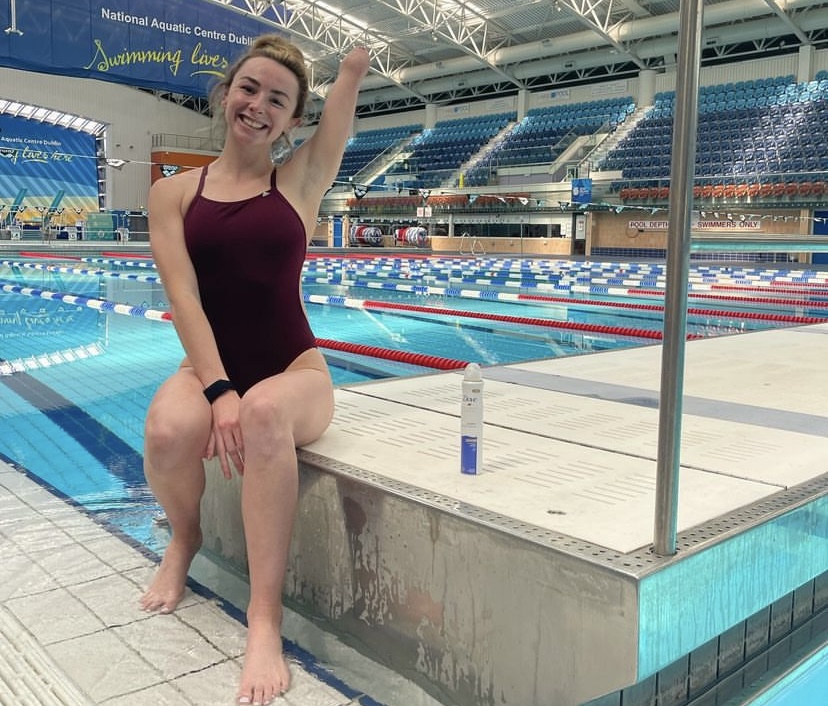
The 27-year-old has represented Ireland in the Paralympics four times, winning a bronze medal in the 100m breaststroke at the 2016 Summer Paralympics and a gold medal in the same event at the 2020 Summer Paralympics.
In June, Ellen won a silver medal in the 100m breaststroke at the World Championships final in Madeira, Portugal.
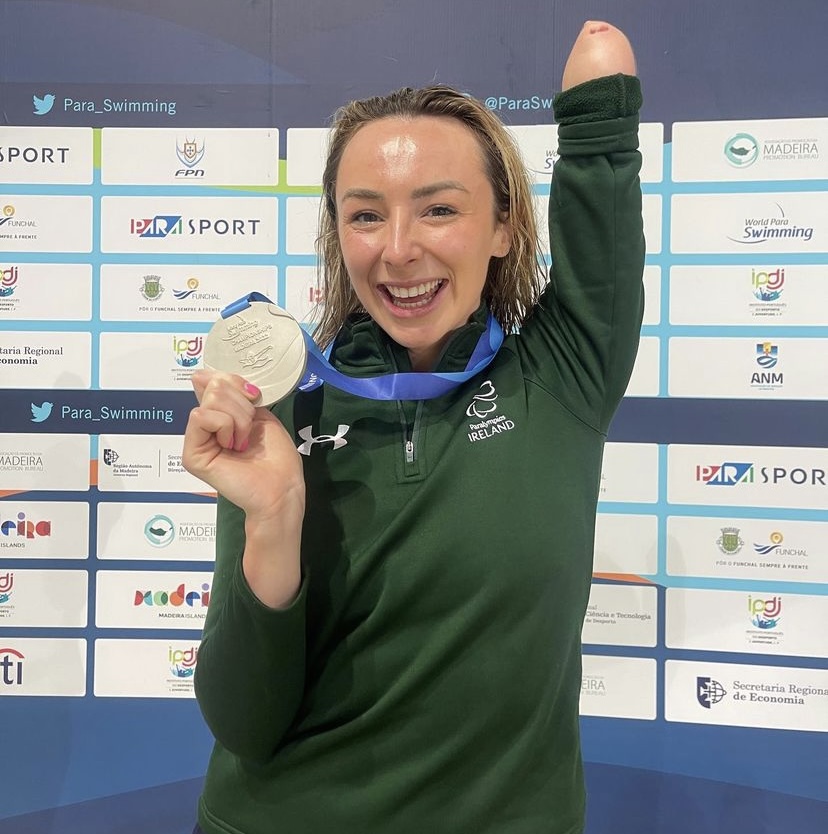
Adding another string to her bow, Ellen impressively placed runner-up on Dancing With The Stars earlier this year, alongside her pro partner Stephen Vincent.
Last month, the Paralympian also launched her own podcast called The D Word, in which she has open and frank conversations with people with disabilities.
While Ellen confirmed to us that she’s newly single after splitting from her boyfriend Gavin, the Dublin native has plenty of exciting opportunities in the pipeline as she’s set to release her own book, and teased the possibility of launching her own brand.
Check out our exclusive chat with Ellen below:
Q. You began swimming at an incredibly young age – did it start out as a hobby, or was it always the goal to represent Ireland in the sport?
When I was doing my lessons, I really didn’t enjoy it at all and I couldn’t wait to be finished with it. Then I went to my first ever swimming competition – and it was just from there that I enjoyed racing so much. I loved the control of it. As soon as I heard whispers of how talented I am and the potential I had, that’s when I got excited and I wanted to represent Ireland. I guess yeah, representing Ireland was in my midst from a very young age.
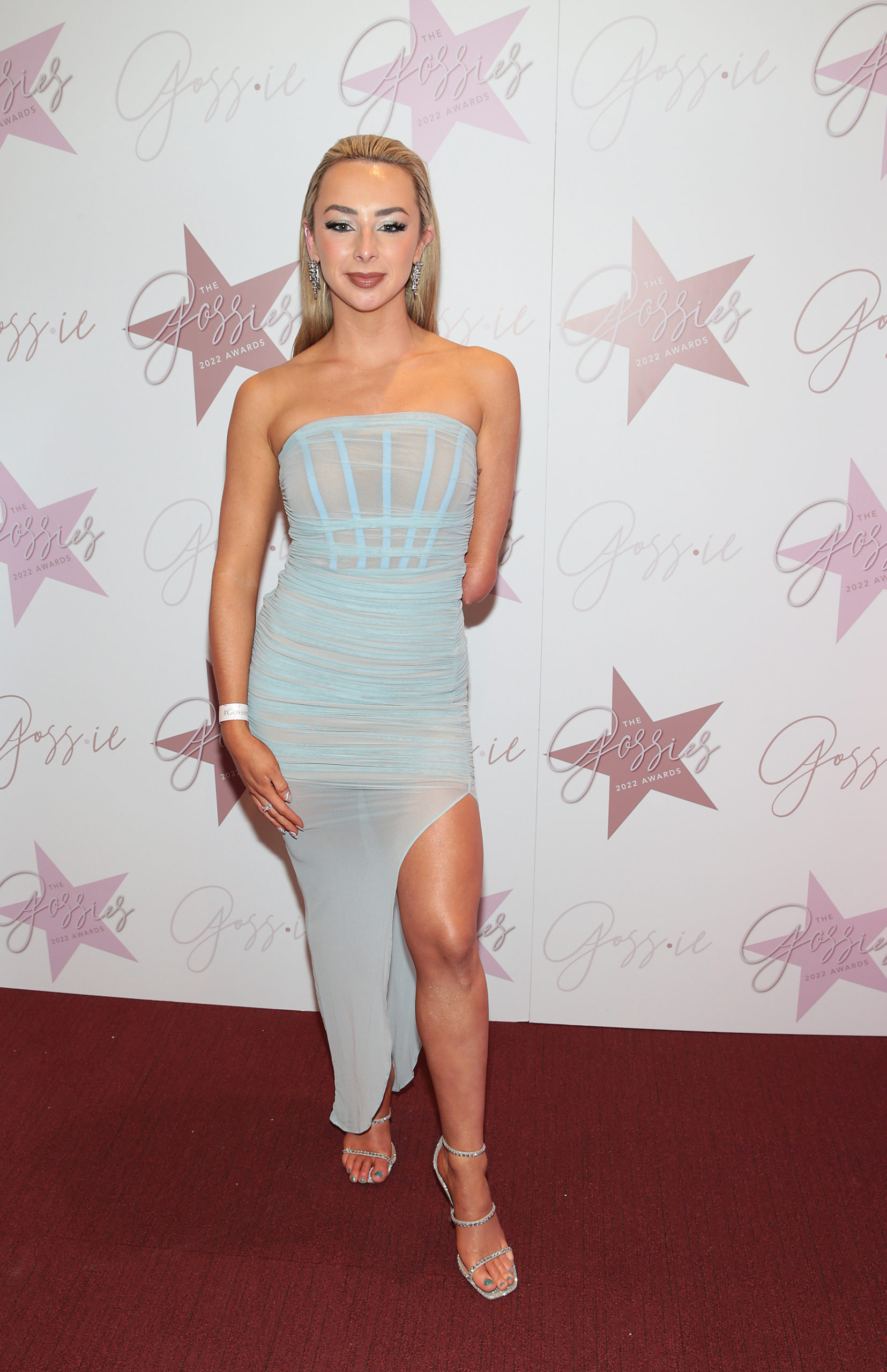
Q. You’ve represented Ireland in the Paralympics four times. What is it like representing your home country? How do you deal with the pressure?
It’s important to stay as grounded as possible. What that means for me is when I’m away and stuff, I don’t really stay in contact with my family at all because they’re getting excited. I try to stay away from social media right before I race because that’s where the distractions could come in and that’s where you can kind of feel the pressure. So, it’s more so about being in the moment and staying in the moment. In the lead up to a big competition is when the pressure can be good because you know you’re not just doing it for yourself, you’re doing it for your country. That can get you really excited and motivate you throughout the hard sessions. You use it in the lead up, but during the competition – I’d just stay away until afterwards.
Q. What has been the highlight of your career so far?
I guess there’s really been two highlights so far. In 2018, we got to bring the European Championships to Dublin and that was the ever Para-event that was ever hosted in Dublin. It was in my home pool and I became European champion, so that was really special. Then, obviously being able to finally win a gold medal at the Paralympics after thirteen years of trying – that was a bit of a moment for me. So, those two are probably my most proud moments.
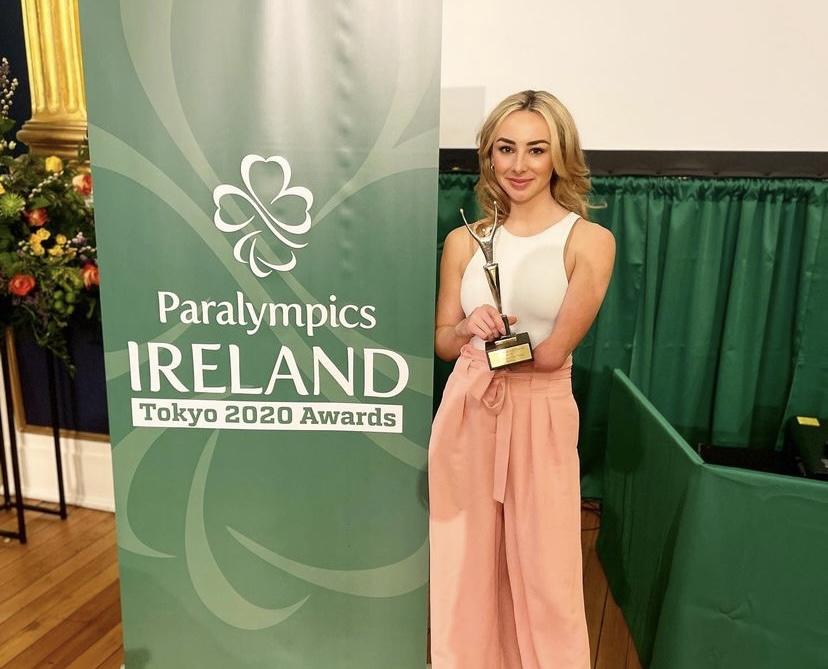
Q. What does it mean to you to be a woman in sport?
To be a woman in sport – I guess, there’s a lot to it. When you’re a woman in sport you have to realise the responsibility you have for the younger generation. What that means is when it comes to interviews and it comes to promoting yourself, you need to throw yourself into those opportunities and those moments because men get it a lot easier than women do. So, you kind of have to take these moments and go with them and tell our stories and tell everyone what we do and who we are – because that’s what is gonna inspire the next generation. That’s what is gonna help people remember sportswomen’s names.
It is a bit of that, but it’s also about doing yourself proud and not getting too caught up in the pressures of it. When I’m in a sport like swimming – swimming is quite gender-neutral – you probably know as many female swimmers as you do male swimmers. There is that side to it as well, but just as a sportswoman you know that you’re trying to keep girls in sport so you take that very seriously.
Q. What do you think is the biggest barrier in driving the visibility of women’s sport?
I don’t know, I honestly don’t know what it is, because Irish women are doing such a good job. Irish women last year and this year in particular have been breaking records and winning medals and winning events and doing things. Just when you think you’ve topped it, the next woman does something and tops it. It’s like a snowball effect of Irish women achieving things. Literally, I was like ‘The women’s national team – wow! That’s probably the best sporting moment,’ and then like ‘Katie Taylor – wow!’ It just keeps happening and it’s so exciting.
It’s just brands and it’s sponsors taking a chance and committing – and daring to commit. You can kind of see that, I noticed it with HerSport.ie put up an article about girls guessing who the sportswomen are, and some of the girls knew who I was and knew my name, but some of them just knew me from the ad. So, even something as powerful as a brand coming onboard and supporting a female athlete makes the visibility so much better. That definitely puts pressure on media outlets as well.

Q. You’re now an inspiration to so many, did you ever anticipate that?
I don’t know, I guess I kind of struggle with that a little bit. When I came home from Tokyo, it’s a weird time because you’ve done something so personal so publicly and then you automatically overnight become an idol or a role model for young people. You just kind of have to take it as it comes. For me, it’s never something I really thought too much about, but I try really hard to give people the time when they give me their time and try and talk to me.
Q. How do you feel about having the responsibility of being a sporting hero and role model? Do you ever feel like you need to alter your behaviour?
Yes and no. I think I’m just really aware of who I’m around and what I’m doing and what is shared publicly and the even the control over my social media; I’m so mindful of what I say and what I do because there’s just a range of people who follow me. There would be certain things that you would send and show your friends that you wouldn’t want kids or even certain adults to see. It is just being mindful. There are very few occasions that I’ll post a drink in my hand for instance because it’s just not what kids need to see. I think that’s always just in the back of my mind and something that I’m always mindful of.
Q. Who were your biggest sporting heroes growing up?
I think that’s why I take the women in sport thing so seriously, because I didn’t really have any female idols growing up. I would’ve really really loved watching rugby and it’s made now, because being in the position that I’m in now I’ve met so many of the rugby stars that I idolised growing up. I idolised Paul O’Connell and now anytime I see him he’s like the nicest man ever! I’m always like ‘This is mad’. It’s so so weird, I’m always starstruck.
I guess, yeah, all of the Irish rugby team. In the world of swimming, my idols would’ve been Michael Phelps and people like that. But I never really had a stand-out person that I really looked up to and I really wanted to be.
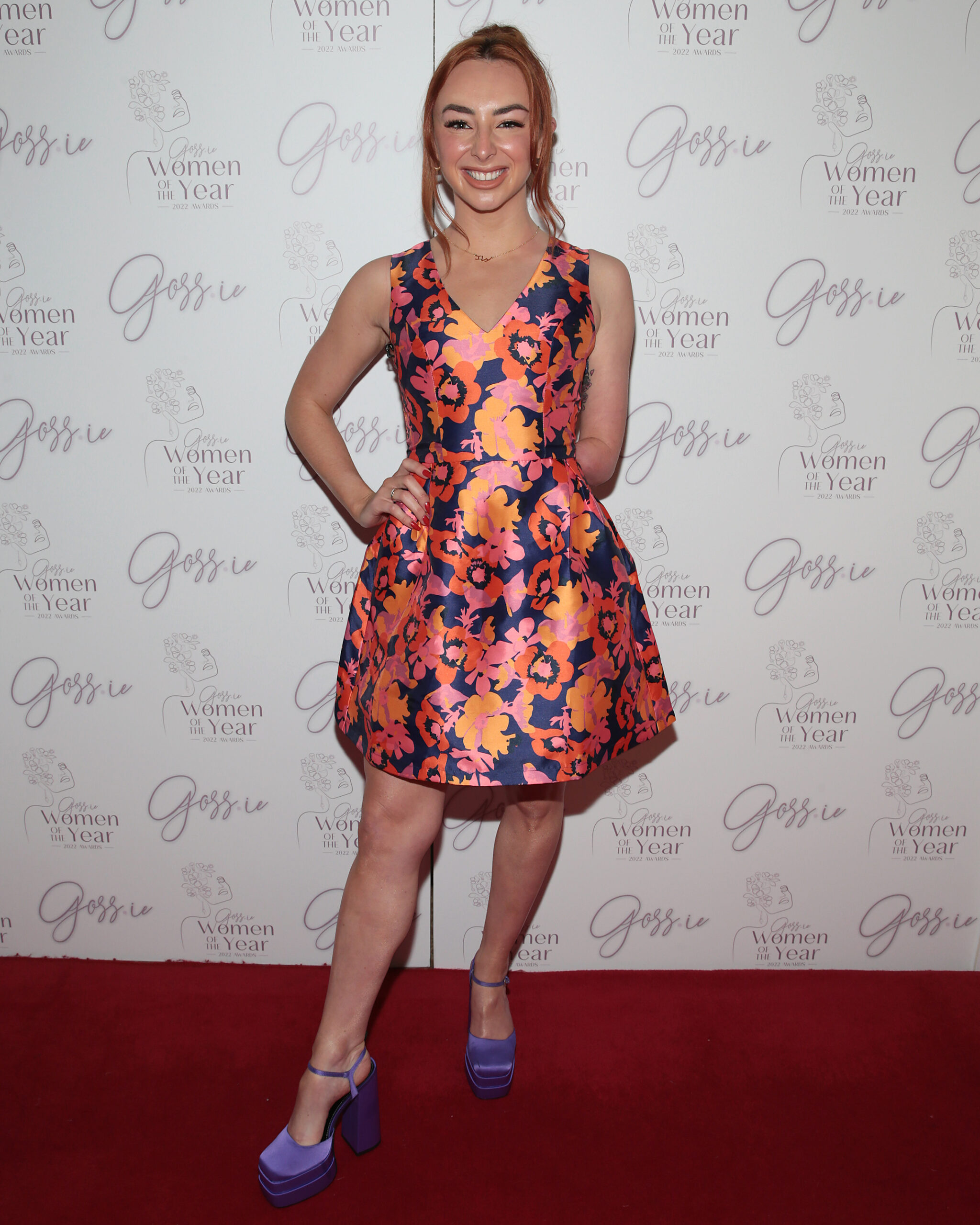
Q. If you weren’t a swimmer, would there be any other sports you’d love to compete in?
During lockdown I tried cycling, and it was awful – so it wouldn’t be cycling! I was watching the marathon and I was watching all the content of the Dublin City Marathon and I was getting so emotional about it. I thought it was such a special thing. I told my agent when I retire I’m going to do the marathon. She’s a running coach as well and she was like ‘No you’re not.’ I was like ‘No, this is something I really want to try!’ and she was like ‘You’re completely underestimating how hard the marathon is.’ I want to try running. I’ve never run, but I’d like to try it. I’ll do it for charity, so at least then some sort of good will come out of it.
Q. There are both pros and cons to being in the public eye – what’s your least favourite part about it?
I think the worst part of it is maybe being misunderstood. Anytime I do an interview or anything, I always have the fear afterwards until it comes or even a podcast – I’m like ‘What did I say? I can’t remember what I said!’ I literally will then send it someone and be like ‘Can you please listen to this and let me know if it’s okay’ Even though it’s already out to the public. I guess it’s the fear of being misunderstood because I try my best not to annoy people or piss people off, and sometimes people can take things the wrong way. So, I guess that’s probably the worst thing about it.
Q. You’ve obviously received so much support on social media since launching your swimming career, but have you ever received any negative comments and how have you dealt with them?
Fortunately enough, I haven’t really had too much hate. The sort of hate that I have gotten can just be from silly people making stupid jokes. I’ve had weird comments before about my arm and stuff. I tend not to give that the time of day, I think it’s just important to give energy to the nice people and the nice messages that you get.
The only time I’ve ever deleted comments is when they’re really inappropriate. That again just comes from being mindful of who can see it. But if anyone was commenting that they didn’t like a certain thing, I wouldn’t delete it or I wouldn’t block it because that’s their opinion and they’re entitled to their opinion. I think if they were being unnecessary or writing disgusting comments, I’d be like okay, people can see that – no.
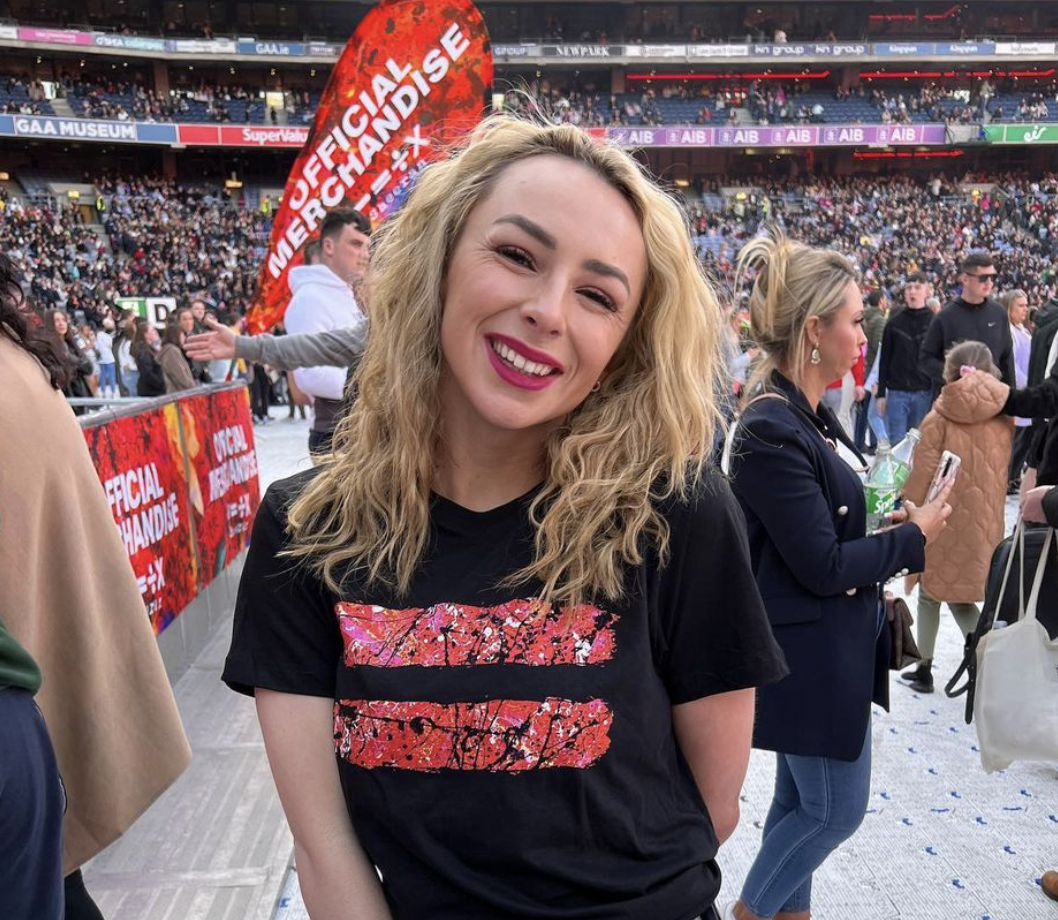
Q. You made it to the final of Dancing With The Stars earlier this year. How would you describe your experience on the show?
Oh my God, it was a whirlwind. It was probably the most emotional thing I’ve ever done in my life because you get so close so quickly with such a random group of people, and they become your family. I loved the whole crew of Dancing With The Stars, not just the other contestants, like the cameramen, the runners, the catering staff and you look forward to seeing them so much. It was so lovely in that sense.
When I was dancing, at times I did feel the weight of the responsibility being the disabled dancer on the show. But it wasn’t really anything anyone ever said to me, it was just kind of in my own head. So, that was the hard part of it. Everyone and the family and the support that I felt from everyone else just made it so much easier. It was just a whirlwind and I’m so jealous that we’re not getting to go back and have a ball. I’m literally gonna feel like Stephen’s cheating on me when he’s paired up with someone else.
Q. Dancing requires a completely different skillset – how was it adjusting to that?
I was so excited because after any games there’s always a bit of a comedown. The post-Olympic blues is definitely a thing. I was so excited to have the show to concentrate on and distract me away from that. So, literally threw myself in. Literally on day one when I met Stephen, I was like ‘So, how are we gonna win?’ Then the show went on and I saw how talented everyone else was and I was like ‘So, the goal now has been re-adjusted and I’d like to make the final!’
It was a weird one as well, because there were obviously dances that you would be really strong at and other ones that you wouldn’t be strong at. Then it was just a pick of whatever you were doing that week. You’d get told you were doing maybe a ballroom dance and you’d be like ‘Oh, but that’s not fun. I don’t wanna do that.’ There’s also certain shoes that you have to wear for certain dances. That was probably my biggest complaint throughout my whole experience: how painful ballroom shoes are. I will never wear them again, but I will wear the latin shoes any day because they are comfortable.
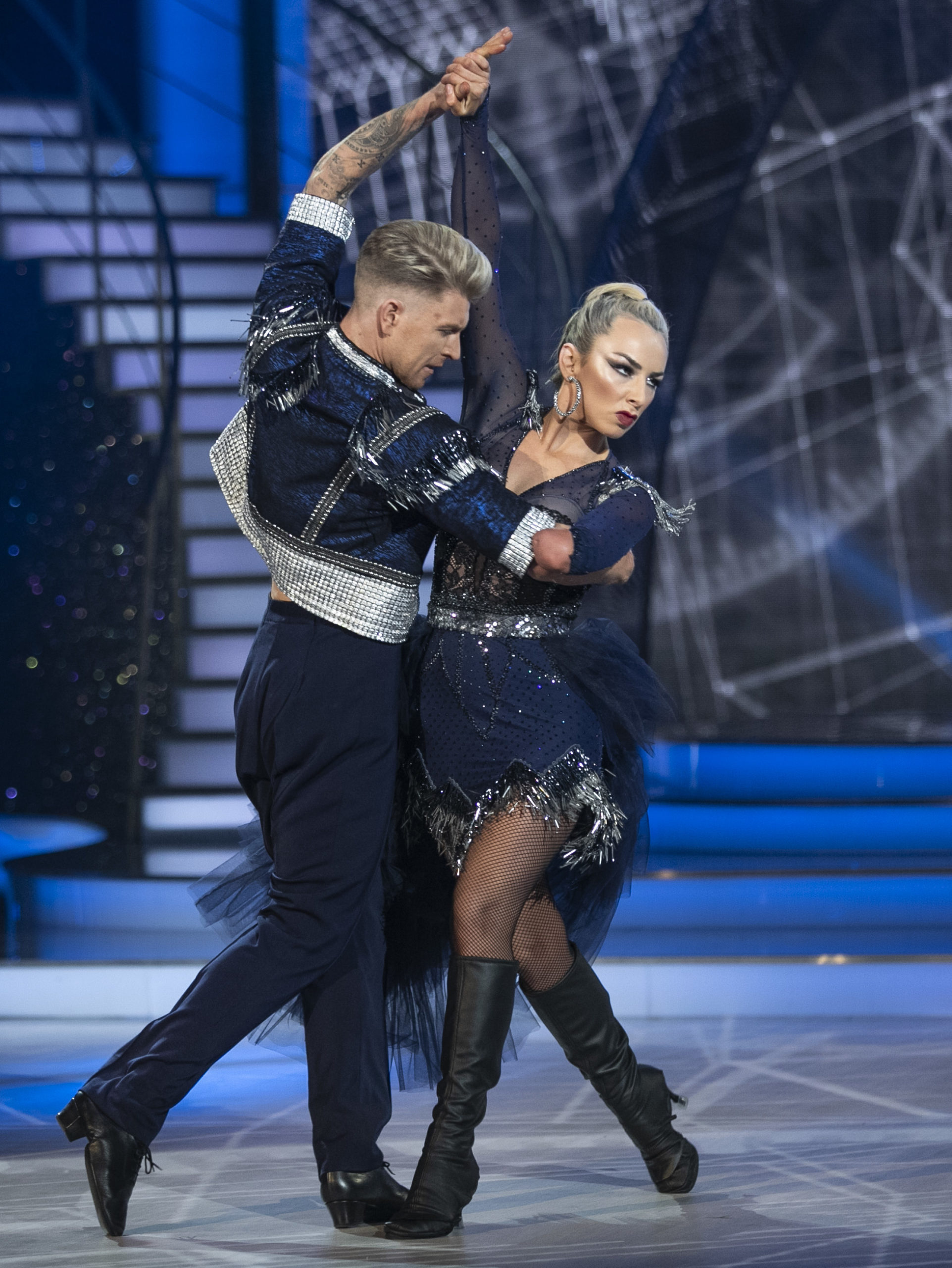
Q. Do you think DWTS increased your public profile?
Yeah definitely, because I’m aware that sport isn’t for everyone. It definitely helped me reach different people and I’ve had such a great following since. It’s so funny because when the show was on, and even afterwards, people would come up to me and be like ‘Oh my God, you’re from Dancing With The Stars!’ and it was never about being a swimmer. Then one time, I think I was at an Ed Sheeran concert, and this girl came up to me and said ‘Oh my God, you’re the swimmer!’ and I was like ‘That’s so weird that you called me a swimmer.’ People are starting to recognise me again as the swimmer – because that its my job!
I think it’s just because people get so excited by the glitz and the glam that is Dancing With The Stars. It’s an entertainment show, whereas sport is really gruelling and you’ve to wait once every four years for a game. So, it’s really only if you’re a follower of sport that you would say swimming to me. People obviously know that I’m the swimmer, but they get excited because of the glitz and glam of Dancing With The Stars.
Q. Are there any other TV shows you’d love to do in the future?
I would’ve loved to have done Ultimate Hell Week, but unfortunately that’s not a thing anymore – which is so sad, I was so annoyed. I don’t know, I don’t know what else is going to be coming up in the next few years, but I wouldn’t say no to doing another show maybe after Paris.
I’m a big talker when I watch TV, so I always joke with people that I’d be great on Gogglebox. If they want me, I am available! Would I try I’m A Celeb… I don’t really know. I’d try to throw myself into the experience but I think I’d get too freaked out by the eating trials. It’s disgusting, and the lack of food and the weight they all lose – it’s just not worth it.
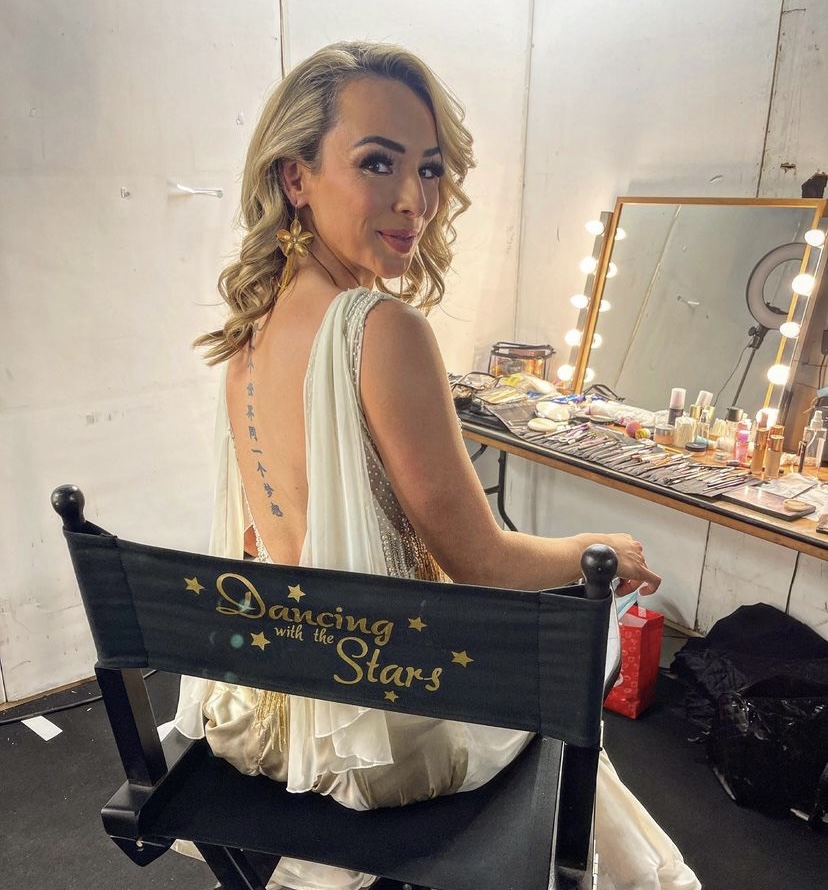
Q. You’ve conquered both the sporting and showbiz world – what’s next for you in the coming years?
Well, I’m back training full time now. I’ve got Championships in August in Manchester. From that, I can qualify for the Paralympics in Paris in 2024. Then, that will be the end of my swimming career. I’m gonna park it there, and then I’d love to go into media or radio or something after Paris. But we’ll see – we’ll get the job done in the pool first and then we’ll see what doors open.
Q. It’s still a while away, but how does it feel coming towards the end of your swimming career?
I don’t know what it is but I feel very excited. I really really appreciate every day in the pool now because I know it’s ticking away and it’s coming to an end. It’s nearly like when you’re in the depths of all the really hard training sessions, it’s hard to see an end. But when you’ve committed to retiring it makes it so much easier to get up for those. I don’t know, I feel kind of light and excited and it’s easier to work hard because I know that it’s not going to last forever.
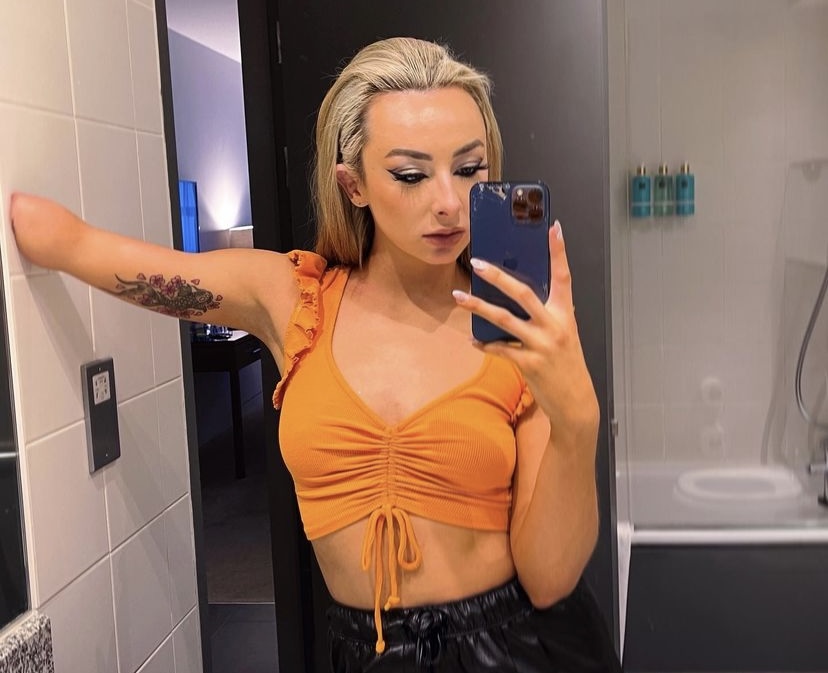
Q. Tell us about your new podcast The D Word and why you decided to launch it?
I had the idea for a very long time; because of the sport that I’m in I was given the opportunity to be in the limelight a lot and have always been nearly the voice of a lot of disabled people when I don’t even have the same experiences. It was really important for me to be able to give back and give other people a voice and share other people’s experiences. I wanted to educate but also make it a bit humorous. That’s why the podcast was really really important to me.
Disability will impact absolutely everyone at some point in their life. I’m going to have different guests on every week who have different types of disabilities. Hopefully at least one person will be able to connect to one episode, which I’m hoping will make a bit of a difference. At the moment, I have six episodes for season one and I’m hoping there’ll be a season two. The last episode will be me interviewing my parents about me being disabled, so I think that will make a big difference for parents as well.
Q. Are there any guests you’d love to have on the series?
I always get asked this question, you’d have think I’d have planned it but I never think that far ahead. I guess recently because Lewis Capaldi came out with his Tourette’s diagnosis, I think he would be a really interesting guy to have on the show. Obviously, because he’s gas, but also to hear his experience and nearly be able to relate on some level to him would be an interesting listen.
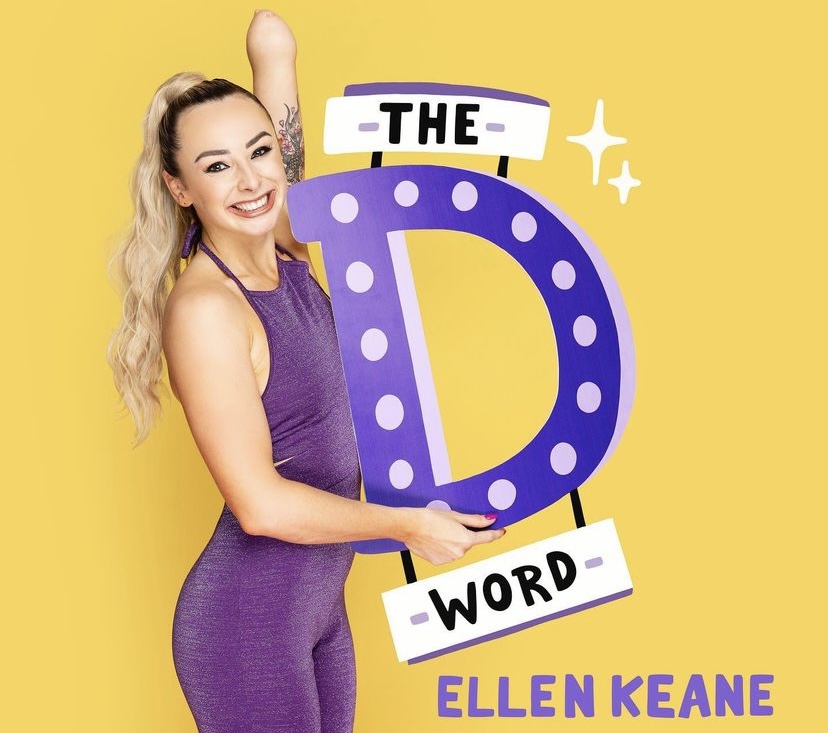
Q. You’re incredibly stylish and we love checking out your outfits on social media. Would you ever branch into the fashion world and launch your own brand/collection?
Thank you for that! I honestly don’t think I’m very stylish at all, you should see what I’m in right now! I have a lot of fun when it comes to not being in swimwear and having dry hair. So, I just love doing that. But if I was to launch a brand I think it would be more of an activewear/swimwear brand, not so much fashion. I think I’ll save that for the experts.
I’d love to launch a haircare brand, in a sense of like how to look after your hair in and out of the water. I have wet hair all the time!
Q. You’ve opened up in the past about not believing in yourself and feeling “unworthy”, is this something you’ve finally tackled?
Yeah, I think I have. I think I’m getting better at being more confident and trusting myself and putting myself at the top of my belief list. I think new experiences are always gonna be a challenge. So, I think it’s just kind of about being a little bit easier on myself if I am struggling. But I’m good at the moment. Actually, when the podcast came out, every time a new episode comes out I’m like ‘Oh s**t, I don’t know if this is gonna work!’ So, that’s a little bit of fear I have there at the moment, but I think it’s going well. Yeah, no. I’m good.

Q. What’s the best advice you have for someone lacking in confidence or self-worth?
I think the number one thing is to try to remember that it’s your life and that the only person who’s suffering at the end of the day is going to be you if you choose not to believe in yourself. It’s about being kind and something that helped with me was finding my passion in swimming and immersing myself in that. When you immerse yourself in something that you’re passionate about, your insecurities disappear a little bit and you learn what it’s like to not have them. Just find something you’re passionate about and throw yourself into it.
Q. What’s the best advice you’ve ever received?
The best advice I’ve ever received was to recognise the privilege I have, because I have had a lot of privilege being able to compete in the sport that I love and being able to do all the things that I’ve done. But I just remember someone telling me how lucky I am and how some people would kill to be able to do certain things that I do. That has always stayed with me.

